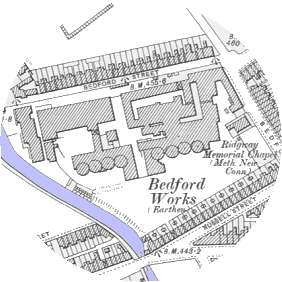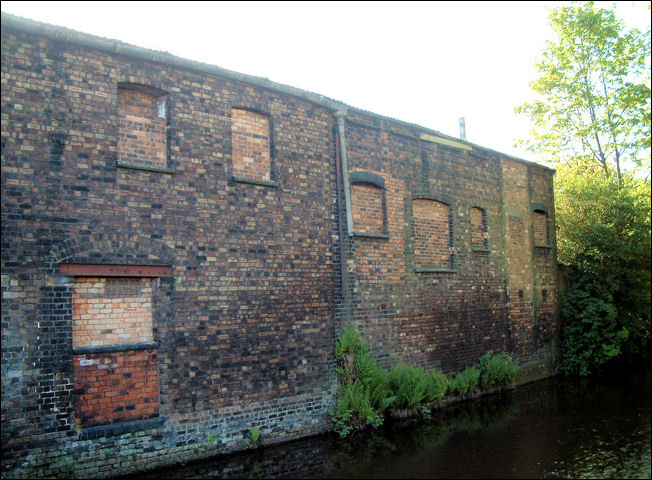|
Pyenest
Street
Pyenest Street, apart
from being home to all these families and many more, plus the then
thriving businesses was also a busy thoroughfare. There were always people
passing along, from first light the window tapping "Knocker Upper"
with his long stick reminding those who used his services that their day had
begun, to the lamplighter attending to two very old gas lit street lamps.

the Bedford Works from a
1898 OS map
the blue line to the left is the Trent & Mersey Canal

four of the huge bottle
kilns of the Ridgways Bedford Works
When the factory hooters
started sounding at Ridgeway’s Cauldon and Bedford works, Twyford’s
Cliffe Vale factory and many others in earshot, we could recognise each
individual one. The scene was set for another busy day. With the almost
total absence of motor vehicles the street was soon alive with people, real
people not faceless ones hidden away in their cars. Front doors would bang
as the occupants left to join the others on their way to the factories or to
the bus stops.
The gates to the Borough yard opposite would open and the
first of the horse drawn carts would soon arrive to pick up the road
building materials that were kept there. The mechanics at Bassett’s on
opening would push out motor cycles onto the pavement to give more room
inside to work. Through the open gates at Leese’s corn merchants the first
lorries were being loaded for trips out into the country. At Brown Brothers
tyre distributors and motor factors, stacks of tyres each individually
wrapped in brown paper were being sorted and across the street Mr Bassett
unlocked his hand-cranked petrol pumps in readiness for his first customer.
The two shops would have opened earlier to catch the passing trade in
cigarettes and matches and the very house-proud would already be out
sweeping the bricks and wiping the overnight dirt off the windowsills.
All this activity was
followed by a quieter interlude until it was the turn of the children making
their way to school. We all walked, at first singly and then in groups as we
neared our respective schools, parents only accompanying their children on
rare occasions such as the first day at a new school or if something was
wrong and usually to the child’s acute embarrassment. During our absence
the street life continued. A steady stream of street traders, either horse
drawn like the coalman, baker, greengrocer, fishmonger, rag and bone man and
in summer the ice cream man blowing his trumpet or on foot, the man who sold
line props or the women selling watercress and the occasional street
musicians, beggars and gypsies.
I particularly recall the
two elderly ladies who sold milk from a large churn mounted on two cycle
wheels, which they pushed around the streets in all weathers. The churn
could be pivoted to fill a stainless steel bucket; this was carried to each
customer’s house to fill a jug left on the doorstep with the required
amount, by means of pint and half pint measuring cans. This really was fresh
full cream milk!

the wharf buildings of
Pyenest Street alongside the Caldon Canals
In the 1930s the canals
were still much in use with a very busy wharf in Cliffe Vale. For the
Boatees and their families the shops at Howard Place offered the nearest and
best selection of goods and Pyenest Street was the shortest route to them,
so we often saw what we thought of as rather strange frightening people
passing by. Women in long skirts, colourful scarves and shawls, men in
corduroy trousers and waistcoats and ragged children all wearing clogs.
There was one old lady who we cruel children would watch for; her face was
disfigured by a harelip and cleft palate. This meant she talked so oddly
that it was almost impossible to understand her. We called her "Minnie
Nick Knock" and from a safe distance would call after her, "Minnie
Nick Knock, Minnie Nick Knock," and would sometimes be rewarded by her
turning on us as if to give chase - naturally we beat a hasty retreat.
Children it seems have always had a streak of cruelty in them.
 |
![]()